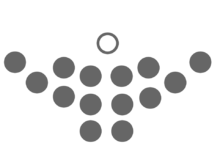Legislature of Cascadia
This article is about the legislative body as a whole. For the current meeting, see the 17th Legislature of Cascadia.
| ||||||||||||||||||||||||||||||||||||
The Legislature of Cascadia is the unicameral legislature of Cascadia, consisting of the Cascadia House of Representatives. It is has continuously operated since August 17, 2022, and is one of only several directly elected legislative bodies on the server.
The House of Representatives consists of 15 representatives, however the total number can be lowered or raised by law, and has been on several occasions. All representatives are elected directly by the people in multi-member geographic constituencies, each electing three to six members to the House of Representatives, on the basis of Proportional Representation by means of the Single Transferable Vote. Political parties, while not banned, do not exist in Cascadia, and thus the House has a much more collegial attitude than many other legislatures that have political parties or groups. Elections are held once a month, alongside elections for the President of Cascadia.
Powers and Duties
The House of Representatives's powers derive from its ability to to change the country's laws, and to amend the constitution (which requires a majority of two-thirds, alongside public referendum). In addition to these key powers, the constitution grants to the House extensive legislative powers and substantial control over the treasury, defense, the sole power to ratify treaties and other kinds of international agreements, and the duty to approve or reject decisions by the President to declare war and make peace. The legislature also has the sole authority over confirming the president's picks for all civil officers of the government, including their cabinet, and has the sole power of Impeachment, along with the prerogative to try impeachments.
Structure and Electoral System
Speaker of the House
For a main article: Speaker of the Cascadia House of Representatives
One member of the House is elected by the other representatives to serve as the Speaker of the House of Representatives to serve as its presiding officer, and presides over meetings of the legislature. They are the chief executive officer of the body as a whole, and represents the Legislature in that capacity. Pursuant to law, the Clerk and Dean have been vested with authority to deputize the Speaker if necessary. Before a successful constitutional amendment passed during the December 2022 general election, the Vice President previously served as the President of the Legislature prior to the creation of the Speaker's office.
Apportionment
The House of Representatives does not have a constitutionally mandated number of seats in the House, and is decided by statute. The constitution, in Article III, Section 2, states that "the House of Representatives must be elected in a fair and proportional manner, however such specific manner may be determined by law." As of the latest election, and the number set for the upcoming election, the number of seats in the House of Representatives is 15, with several members elected from several geographic multi-member divisions, which are redrawn every so often to account for activity and population changes necessary to alter the boundaries.
The Electoral Commission of Cascadia, a constitutional body established for the sole purpose of revising electoral boundaries before each election, oversees this process, consisting of the Chief Justice, Vice President, Public Advocate, Speaker of the House, and a final commissioner chosen by and from the House's members.
Prior to the creation of the Electoral Commission in the National Constitution ratified on January 1, 2023, the Legislature had redistricting authority, and exercised such powers through the House Standing Committee on Apportionment, often called the Apportionment Committee, which was responsible for making these changes and proposing them to the house prior to general elections, with approval of a two-thirds votes in the House. The Committee was made up of 5 members, chosen by the House as a whole, with the member receiving the most votes to be on the Committee becoming its Chair.
Electoral System
Under the National Constitution, the House is to be elected by single transferable vote in multi-member constituencies, with no constituency allowed to have less than three seats, unless one constituency is deemed necessary to have two seats under the Electoral Commission's proposal. There is no maximum number of seats for a constituency, and as such, as was done in the June 2023 elections, it is possible to create a single national constituency to be allocated every seat in the House. The electoral system for the House balances local representation and the link between legislator and constituency, while also creating proportional representation and ensuring all major groups are proportionally represented in the Legislature.
Current membership
For full article, see Current members of the Cascadia House of Representatives.

